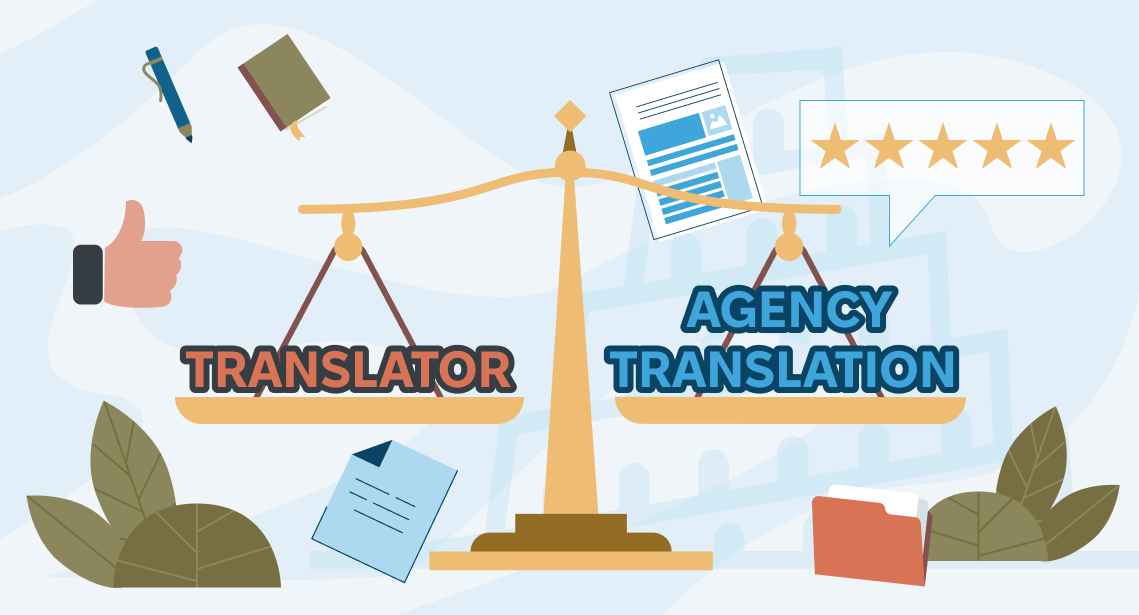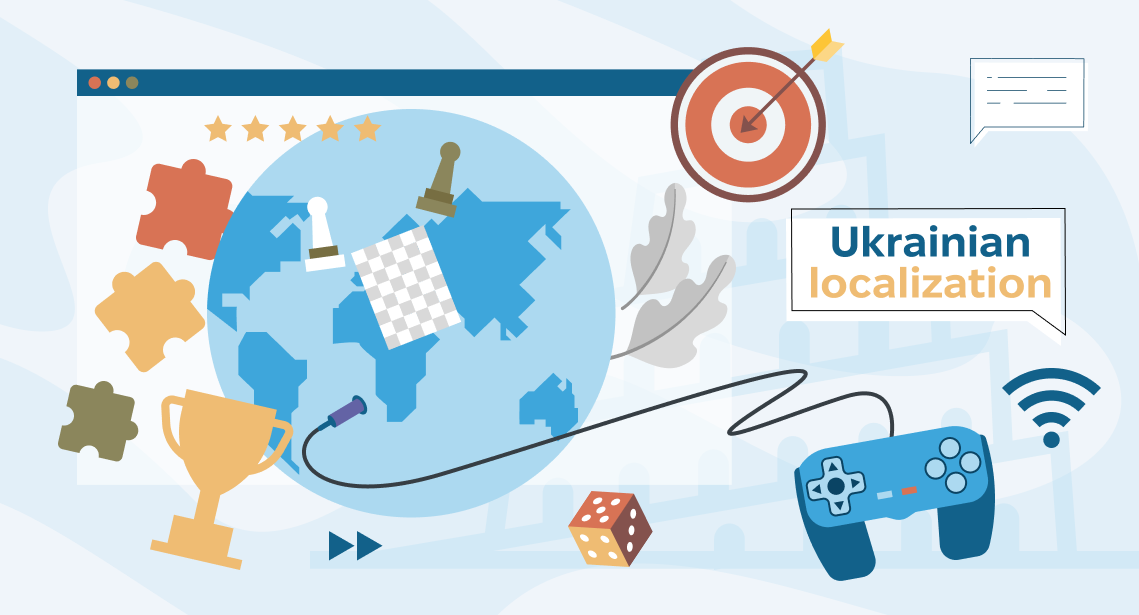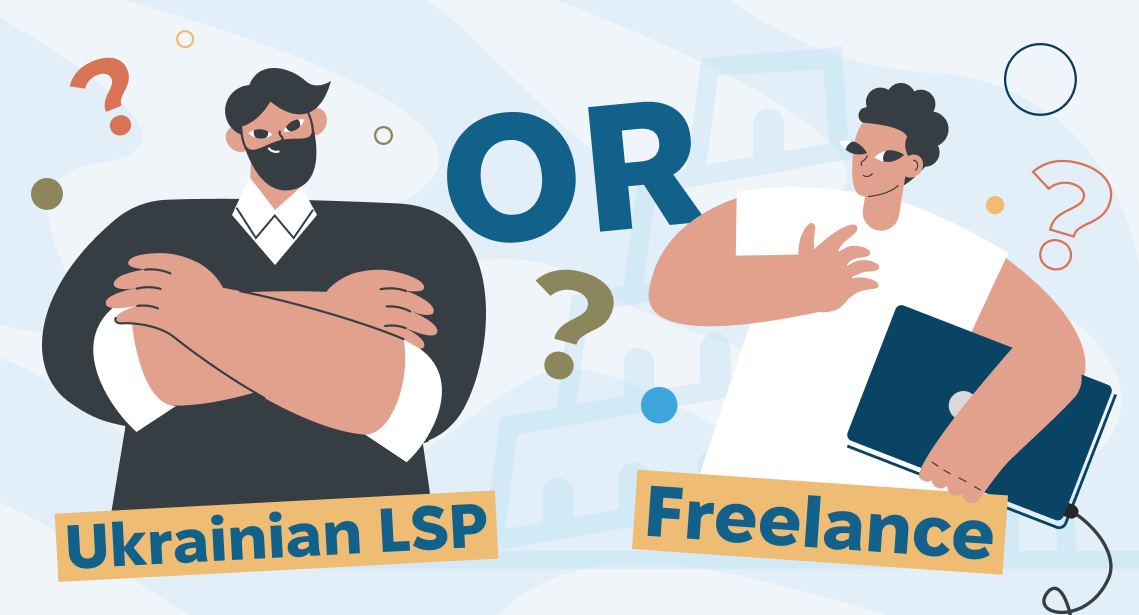Translator vs. translation agency

There have been perpetual discussions within professional translation circles between translators and translation agencies, whereby translators have questioned the existence of translation agencies per se. They see them only as commercial agents who reap the cream but do not benefit clients in any real way. Now and again debates have arisen about whose services the client should better use: an independent translator or a company providing translation services. In this article, we will try to investigate this matter and consider all the advantages and drawbacks of dealing with independent translators vs. translation agencies.
Prices
As translation agencies are, among other things, really agents between clients and translators, as a rule, their prices are higher than freelancers’. Ergo, an independent translator will beat an agency in this regard.
However, exceptions happen here too. Highly skilled translators who have accumulated an extensive client base and garnered their reputation for many years of professional work can ask for fees matching or sometimes exceeding the fees of translation agencies. Such translators do not cooperate with agencies as their engagement makes a translation agency uncompetitive in terms of price.
There are also “dumping” agencies that attract their clients by using very low prices. Such agencies keep quiet about the fact their prices are a result of spending nothing on recruiting professional translators and assuring the quality of their work. By entrusting your translation to such companies, you should be prepared that your text will be translated by a student or just by anyone.
Performance quality
Selecting a high-quality contractor is perhaps the most difficult task for any client who is not familiar with the translation industry. Both translators and translation agencies can render services with varied quality. Here, the most important thing is not to make the wrong choice.
As mentioned above, some freelance translators do their jobs with a high degree of quality and have garnered a good reputation among their clients. Such experts often suggest there is no need for translation agencies in principle, and they can carry the weight of the world on their shoulders all by themselves. But they forget one important thing: the majority of translators will never reach their level. Experts such as themselves are rare and it is very difficult for inexperienced clients to find them among many unskilled translators. This is demonstrated by the following statistics collected by us over 5 years:
- About 65% of applicants for a translator’s position do not know the basic rules of punctuation, grammar, and spelling, which they learned back in high school. It means they are illiterate despite their university degree.
- No more than 5% of candidates can pass the translation test at an acceptable level.
Therefore, if you are not able to assess by yourself the professional level of the translator to whom you entrust your work, there is a 95% probability that you will get a low-quality translation. To reduce such risks, you need to find a translator with references and make sure that the people who recommended him or her can adequately assess the translation quality.
The advantage of dealing with translation agencies is that they recruit and engage competent translators in advance, and often work with them for many years. In addition, with well-built processes, a translated text is proofread by an editor and checked using specialized tools.
Consequently, the risk of receiving a poor-quality translation from an agency is lower than from a randomly selected translator. However, these risks remain. Selecting a service provider is always difficult for a translation services client. In Kyiv alone, there are more than 300 companies that position themselves as translation agencies. However, most of them deal with simple orders such as translations of records and certificates that are made using templates; and inserting new names in standardized translations. The majority of these translation agencies hire cheap, unskilled translators and produce much the same result. According to our estimates, only about 10 companies in Ukraine comply with QA (quality assurance) standards that are required to ensure a decent result. Many websites in the Ukrainian Internet are difficult to read, and the reason is the poor quality of translation made by such agencies.
Therefore, if your goal is to receive a translation that won’t embarrass you in front of your clients, we recommend that you choose your translation agency carefully. Different criteria can be used to make this choice, but we’ll present the most basic:
Price. Translation is a job for a skilled professional. You’ll need to hire specialists with an appropriate level of expertise, and these experts require appropriate payment. Thus, judging by a company’s prices alone, you can surmise the skill level of the translators they hire.
The following is a reasonable budget for a translation project:
- The translator receives 50%
- The editor receives 25%
- 10-15% goes to administrative and other costs
- The translation agency receives 10-15%
Look at the per-page price of translation and divide by 2. The result is approximately what the translator receives for one hour of work. Then consider whether a professional, with a higher education, many years of experience, and a respective level of intelligence, would work for that kind of money. If that is unlikely, then your important translation will probably be entrusted to a student or an amateur. Alternatively, the editing stage may simply be omitted, leaving no place for QA.
QA processes. A translation agency must have quality assurance processes. Ask a translation agency representative to describe them.
Rapid response. If you contact a translation agency via email or by a form on their website, you should receive a response in no more than one hour. You should receive a reply to correspondence in less than 20 minutes.
A test translation may include up to 200 words. When competing for a large order, a serious translation agency is generally willing to provide a small test translation to convince a potential client that it provides high-quality services. This question alone can screen out some shoddy service providers. Furthermore, you can submit the test translation to different service providers to compare quality. By the way, we recommend having a competing translation agency perform the quality check.
Quality of the text on a company’s website. Be sure not to run up against a “shoemaker without shoes”. The websites of some translation agencies have lots of basic grammatical, punctuation, and spelling mistakes. These mistakes can even be found in paragraphs describing how thoroughly they work to ensure translation quality! The presence of these mistakes on a translation agency’s website increases the likelihood that similar issues exist in translations made for its clients.
Brand. Any company that reaches a certain level tries to build a recognizable image. Of course, a logo, corporate identity, a website, and a custom email address, do not tell you about the quality of an agency’s translation work. However, at a minimum, their absence indicates a weak organization of processes.
Volumes and deadlines
If you need to translate large volumes of text, you will have to accept that it will take quite a long time for an individual translator and you will not be able to speed up the process. A translation agency can engage several translators and editors to translate large volumes of text in a relatively short time.
Of course, clients can find several translators by themselves distribute portions of the text among them, and then collect all the translated portions. However, several issues arise in such cases:
- You will have to find several qualified translators immediately, which is a problem itself.
- Even if the translators do their job to a high standard, their translations will differ significantly. Therefore, you will need an editor who can consolidate the style, glossary, and terminology. Finding an editor is difficult even for a translation agency and almost impossible for an inexperienced client.
- The above actions have to be coordinated. A person who has the respective skills and background should do this job, and such people usually work in translation agencies.
It means that actually, you will have to set up your small translation agency to solve the issues that arise in the course of fulfilling large projects. But ask yourself these questions:
- Do I have enough skills and experience to do this to a high, professional standard?
- Do I have time for this?
- Do I need a translation department regularly?
If the answer to these three questions is “yes”, then it makes sense for you to create your team of translators. The problem is that in many companies this is often done at an amateur level: the task is entrusted to a person who has never worked at a translation agency; who does not know how to recruit translators, to set up QA systems, which professional tools to use, etc. It means they start doing things when they do not have enough competence to yield the respective results. That’s why, if you have ventured upon this, I would recommend you to talk to a professional translation agency, so they can audit your team of translators.
But the easiest way is to simply entrust all those cares to a translation agency, and not spend the effort trying to solve tasks that will only distract you from your main line of business. This is a more constructive way.
Stability and availability for work
An individual translator works with many clients at the same time. Those clients may send orders simultaneously; which is why such translators will simply turn down some of the clients’ orders. In addition, such translators may be unavailable due to sickness or personal circumstances, e.g. vacation. It means that when dealing with one person you will never be sure that he or she will accept your next very urgent project for translation.
As a rule, a translation agency will always find a backup qualified translator, so you may rest assured that you won’t be put in a long queue of waiting clients. As opposed to a freelance translator, a translation agency can upscale and adapt to your deadlines and volumes because its capabilities are not limited to one translator.
Communication
For any client, it is important to be able to contact their contractor at any moment, to specify details, provide additional instructions, reschedule work, etc. Both freelancers and translation agencies are usually available. Nevertheless, a person may have situations when he or she cannot reply to an email or answer a call as often.
Conclusions
If someone were to ask the author of this article: “Who is better to work with a translation agency or an independent translator?” he would answer: “It depends on the agency and the translator.” simply because it would be a lottery without a thorough selection. However, there are far fewer incompetent translation agencies than unqualified translators in the percentage and numeric ratio. That’s why, if you select your translator from a translation agency, you will spend less time and will have less risk, but you will pay a greater price. It is up to you to decide if you want to take the risk.
Translation agencies do not just function as coordinators, they fulfill additional roles: they select competent translators, control the quality of translations, ensure the coordination and unification of large translation projects, guarantee continuous communication with clients, and are constantly available for work. Without dealing with translation agencies, clients would have to do these jobs and spend their own time.
However, all these advantages disappear if you entrust your translation to an unscrupulous translation agency that does not use the QA and coordination processes described above. In such cases, you will pay more but will get the same result as an incompetent translator. Therefore, be very cautious about selecting your contractor.




